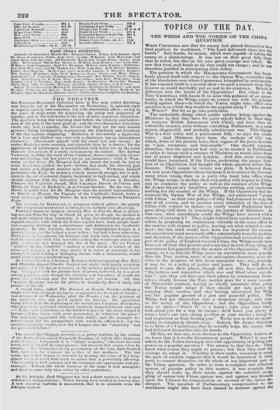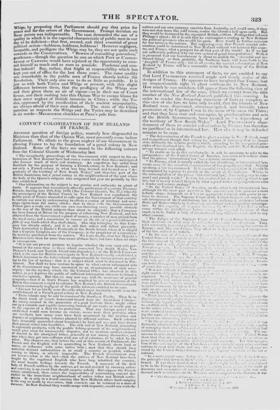TOPICS OF THE DAY.
THE WHIGS AND THE TORIES ON THE CHINA QUESTION.
WHEN CROMWELL saw that the enemy had placed themselves in a fatal position, he exclaimed, " The Lord delivered' them into my hands." Into hands, he meant, which were capable of taking the enemy at a disadvantage. It was not on their great folly alone that he relied, but also on his own great courage and talent. He saw that from such hands as his they could not escape; and lie was therefore justified in anticipating their defeat. The position in which the MELBOURNE Government has heed- lessly placed itself with respect to the Opium War, resembles that of the blunderers over whom CROMWELL triumphed by anticipation. It has exposed itself to a mortal blow—to such a censure from Par. liament as would inevitably put an end to its existence. Behold it delivered into the hands of the Opposition! But where is the Tory CROMWELL with hands fit to seize this godsend of art oppor- tunity, in which the Whigs might be turned out with the popular feeling against them—in which the Tories might take office on a question as to which they would be the popular party ? The answer is, Where? But let us go into particulars. The undeniable charge which public opinion brings against the Ministers is, that they have for years utterly failed in their duty as respects British intercourse with China, and have thus in- volved the country, even without consulting Parliament, in most Opium a ituost unjust, disgraceful, and probably mischievous war.
War is a foul crime and a preilininent folly : so says the public
voice. And Ministers have been the authors of this war, which, down to the present hour, their organs of the press describe as " just, necessary, and honourable." One should suppose, therefore, that the question had only to be mooted in Parliament in order to insure such a censure of Ministers as would drive them out of power disgraced and helpless. And this most assuredly would have happened, if the Tories, performing the proper flaw- tion of an Opposition, had brought the whole question before Par- liament. Their course to victory was plain. It behoved them, not less as an Opposition whose business it is to correct the Govern- ment when wrong, than as a party who must take oflice when the Whigs resign, to declare their own policy with respect to China, and to condemn the policy as well as the conduct of the Whigs. Sir JAMES GRAHAM'S resolution proclaitns nothing, and condemns nothing but the conduct of the Whigs. If the Opposition had de- nounced the Opium War of the Whigs, and proclaimed " peace with China" as their own policy—if they had proposed to stop the war at all events, and to prevent every infraction of the laws of China with respect to opium—so surely would Parliament have gone along with them in censuring the conduct of Ministers. In that ease, what amendment could the Whigs have moved witli a chance of carrying it? They might indeed have condemned them- selves, by proposing an amendment virtually to the same effect as the motion with respect to policy, leaving out what related to con- duct ; but this trick would have been too impudent for success. An amendment must necessarily differ substantially front the motion; and therefbre, if the mothat of the Opposition had covered the sub- ject of the policy of England towards China, the Whigs would have been cot off from that ground, and must have moved, it tiny' thing, an amendment less popular than the motion of the Opposition. We'll engage, as it is, that the Whigs move an amendment more popular than the Tory motion, mote of an anti-opium character, more ad- verse to the progress of this most unpopular war ; nay, pointing, it may be, to at policy of justice and peace. They will do so, merely to save their places, though till now they have talked of "the redress and reparation which war and blood alone can ob- tain " and they can thus save their places by condemning them- selves, simply because the Tory motion goes for a mere censure of .Ministerial conduct, leaving us wholly uncertain what policy the Tories would adopt if' they should get into power by carrying their motion, and also leaving uncovered, Ibr Whig use, the popular ground of a just and peaceful policy. 'I he Whigs had got themselves into a desperate scrape, and were at the mercy of the Opposition : but the Opposition kindly says to them—" Don't he in a hurry ; take your own time; look about you for a way to escape ; we'll leave you plenty of room ; here's our own strong position at your service ; accept it, and so prevent us from beating you." Never was so line an oppor- tunity SO completely thrown away. Indeed, Sir JAMES GRAHAM is SO little of a Citostwisw,, that he actually helps the enemy who had delivered themselves into his hands.
All this, we dare say, is as obvious to the Opposition leaders, as we know that it is to the Government people. What ! it may be
asked, do the Tories knowingly miss this opportunity of getting into power on a popular question ? The answer is, that they do. hey know what course they ought to pursue ; but then they want the courage to adopt it. Timidity in their ranks, assuming as usual the garb of caution, suggests that it would be imprudent m their party to commit themselves on the whole or any important part of the China question. In order to form a complete and coherent symtem of popular policy in this matter, it was requisite that they should make up their minds against the unlawfid smug- gling of opium into China, against war, and against any demand upon the Chinese for compensation on account of the opium de- stroyed. The question of Parliamentary compensation to the merchants might also have been turned to account against the Whigs, by proposing that Parliament should pay that price for peace and for the errors of the Government. Prompt decision on- these points was indispensable. The case demanded the use of a i quality in which it is the especial characteristic of public men in our day to be deficient—that first, second, and third essential of great political action—boldness, boldness, boldness! However negligent, incapable, and profligate the Whigs may be, they are not quite such cowards as the Conservatives. " Beware of coma/111v yourselves," gentlemen—though the question be one on which PITT or CisTi.e- BEAGB or CANNING would have rejoiced at the opportunity to com- mit himself as much and as soon as possible. Prudence and cau- tion indeed! Say, rather, that fright at responsibility which has kept you out of office for the last three years. The same quality was remarkable in the public men of France shortly before the Revolution. Their only aim was to do as little as possible. It is just so with both Tories and Whigs at present, with this slight difference between them, that the profligacy of the Whigs now and then gives them an air of vigour—as in their use of Court favour, and their rushing into this Opium War to escape blame for their utter neglect of British interests in China ; while the To- ries, oppressed by the recollection of their ancient unpopularity, are always afraid of their own shadow. The state of the China question as respects the Whigs and the Tories may be described in six words—MELBOURNE chuckles at PEEL'S pale flux.



























 Previous page
Previous page